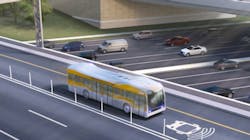Automated Bus Consortium transit and transportation agency members announce candidate pilot projects across U.S.
The Automated Bus Consortium (Consortium) explored the feasibility of implementing test-pilot automated bus projects across the United States at its private industry forum hosted by AECOM and the Michigan Department of Transportation (MDOT)/PlanetM.
Opening remarks and status updates on the program were provided by representatives of AECOM, PlanetM and MDOT. Each member agency shared the proposed pilot projects across a variety of geographies and a range of vehicle applications including bus rapid transit, shuttle service, arterial rapid transit, express service, fixed-route service and maintenance depot automation.
The following U.S. transit and transportation member agencies presented potential pilot projects during the event: Connecticut Department of Transportation (CTDOT); Dallas Area Rapid Transit (DART); Foothill Transit; Long Beach Transit (LBT); Los Angeles County Metropolitan Transportation Authority (Metro); MetroLINK (Moline); Metropolitan Atlanta Rapid Transit Authority (MARTA); Metropolitan Transit Authority of Harris County (Houston); Michigan Department of Transportation (MDOT)/Capital Area Transportation Authority/Michigan State University/Huron Transit Corporation; Minnesota Department of Transportation (MnDOT)/Rochester Public Transit; Pinellas Suncoast Transit Authority (PSTA); and Virginia Department of Rail and Public Transportation (DRPT)/Hampton Roads Transit.
AECOM presented draft automated bus specifications developed by the Consortium members for manufacturing industry representatives’ comment and discussion. The forum allowed Consortium members to solicit input directly from industry manufacturers regarding their ability to supply automated buses that could achieve the desired efficiency within each proposed pilot project.
The Consortium’s plan calls for a 12-month feasibility phase, followed by implementation within a two-year time frame, currently estimated to begin in 2022. Each agency participant will make their own independent decisions regarding future automated bus purchases and deployment following the completion of this feasibility phase.
